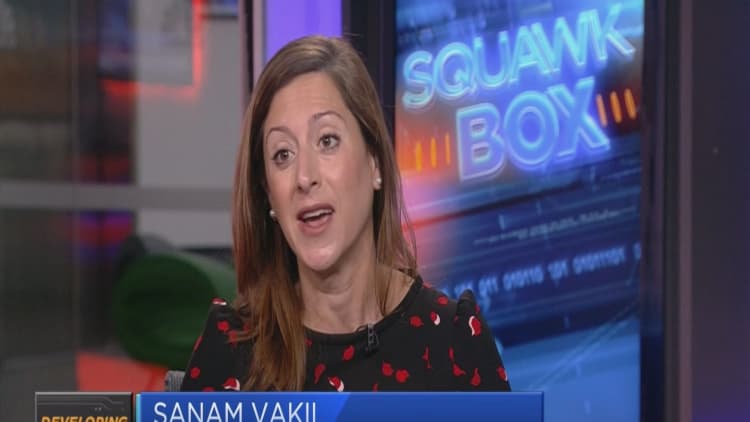
Saudi Arabia could soon take action to push oil prices lower, one analyst told CNBC Tuesday, as part of a "settlement" plan to alleviate diplomatic tensions with the U.S.
It comes at a time of international outcry after journalist Jamal Khashoggi — a U.S. resident and prominent critic of Crown Prince Mohammed bin Salman — disappeared after entering the Saudi consulate in Istanbul on Oct. 2.
Turkish authorities claim Khashoggi was murdered and his body removed. Saudi Arabia vehemently denies that.
"My guess is the quid quo pro is likely going to be that the Saudi's end up pumping as aggressively as they can. And so, all things being equal, I think this is probably negative for the oil price," Michael Harris, founder of Cribstone Strategic Macro, told CNBC's "Squawk Box Europe" on Tuesday.
Harris said rising diplomatic tensions between Saudi Arabia and the West could ultimately become "hugely problematic" if it triggered oil prices to spiral out of control. That's because investors would then need to worry about Riyadh's leverage in the energy market.
"But I think the exact opposite is going to be happening. The Saudi guilt is going to play into the oil price," he said.
International benchmark Brent crude traded at around $80.20 Tuesday morning, down around 0.7 percent, while U.S. West Texas Intermediate (WTI) stood at $77.23, almost 0.8 percent lower.
Weaponization of oil
U.S. Secretary of State Mike Pompeo landed in Saudi Arabia to meet King Salman Tuesday morning, amid mounting pressure on the kingdom to explain the fate of Khashoggi.
President Donald Trump has threatened "severe punishment" if it is found Khashoggi was killed in the Turkish consulate, prompting Saudi Arabia's state news agency to respond by saying it would retaliate against any economic sanctions.

Escalating diplomatic tensions between the strategic allies has prompted speculation among oil traders that Riyadh could be tempted to weaponize its oil dominance.
"U.S. policy has inadvertently given carte blanche to the (Saudi) leadership to act with impunity," Sanam Vakil, senior consultant at Chatham House, said in a research note emailed to CNBC on Tuesday.
"They didn't anticipate that the international community would care so much about a journalist and I think this is where the Trump administration hasn't really delineated red lines in their relationship."
Saudi Arabia produces about 10.5 million barrels of oil per day, equal to more than 10 percent of global crude demand. It exports about 7 million barrels a day of oil, depending on the month.
Given those figures, the oil-rich kingdom is a central pillar of the global crude market at any time. But its influence is especially pronounced right now.
Expensive energy
Energy watchers are closely monitoring Brent, which has pulled back from recent multiyear highs but remains established above $80 a barrel.
So far this year, the price of oil has surged around 20 percent. It comes amid concerns over Saudi Arabia's ability to ramp up production when U.S. sanctions come into force against Iran early next month.
The U.S. is currently relying on the OPEC kingpin to increase output and blunt the upward pressure on energy prices.
Trump has repeatedly blamed OPEC for soaring gasoline costs, as prices continue to head in the wrong direction for American consumers with midterms just around the corner.
— CNBC's Tom DiChristopher contributed to this report.


